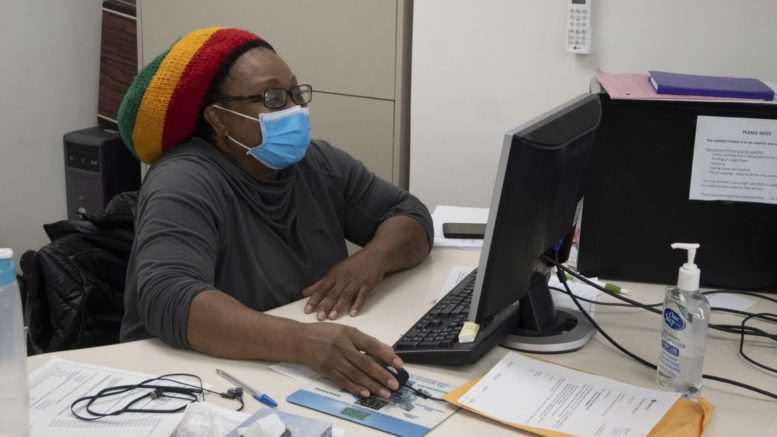By 1:55 p.m. the lineup outside a new unnamed, unassuming food bank in a Scarborough apartment building has stretched all the way down the hall, with patrons evenly spaced the entire way.
One by one, the volunteer standing at the door waves them in, sprays their hands with sanitizer, and directs them to one of the two tables with groceries at either end of the room. At the tables are more volunteers who carefully layer the items in buggies and bags for those in need.
Even without the extra safety protocols in place for the pandemic, it’s easy to see how difficult it is running a community food bank.
Last year, a charity called the Toronto Foundation conducted a study to see the effects the pandemic had on the city. It showed that during the initial business closures, 40 per cent of food banks closed their doors at the precise moment they were needed most. That’s why Beverley Dwyer opened this one.
Dwyer, who also owns a nonprofit thrift shop that focuses on helping women in the community, knew it would be an uphill battle. With unemployment rising and other food banks collapsing under the pressure, she quickly realized her initial bi-monthly approach wasn’t going to cut it.
“The first day we opened the food bank, everything disappeared in 15 minutes,” she said. “So then we started a weekly food bank.”
But even with donations and community outreach, demand continues to outpace the supply. Dwyer says the lockdowns have “devastated” the communities’ already marginalized members.
WATCH | Scarborough food bank struggles to meet demand:
Scarborough is comprised of roughly 70 per cent visible minorities who have been affected disproportionately by food and work shortages. Before the pandemic, only 10 per cent of white households were affected by food insecurity, compared to 28 per cent of Black households, according to the Toronto Foundation’s report.
“There are people who are not working. Thank God the government brought out CERB which helped a lot of people, but as we speak today I know multiple families living in one apartment,” said Dwyer.
Familiar faces in the line
Many of the people in the line are familiar faces who the volunteers have come to know on a first-name basis. Lisa Sampson, another longtime volunteer of the thrift shop and now food bank, deals directly with patrons and helps hand out the food to people as they come in.
If she recognized someone who she knows has a large family, she might offer some of the milk in bags instead of the small cartons. That’s the power of community.
Almost every week, the food bank runs out of food and volunteers must turn people away. Sampson admits she didn’t realize how difficult sourcing enough food would be.
“Even if it’s just sending a dollar into the Daily Bread Food Bank, every little bit counts,” she said.
The Daily Bread Food Bank reported a 25 per cent increase in its daily usage and a 200 per cent increase in new patrons since the beginning of COVID-19. With every additional lockdown, the problem is exacerbated.
Toronto Community Housing provides the space for this food bank in one of their buildings’ event rooms. One staffer, who declined to give his name, has noticed the uptick in demand, as well.
“They started out with low numbers but it has increased since the second lockdown. There’s never enough food. She always runs out.”
“People help people.”
—Beverly dwyer, founder of a new Scarborough food bank
One of the building’s residents, who relies on the food bank and preferred not to be named, has lived there for 19 years and says that going to the store to get groceries is just one of the challenges the lockdown has created.
“Going somewhere else, like for a photocopy, they’ve temporarily shut down so where do you go to make some photocopies?”
Basic services compromised by pandemic
Services like printing and wireless internet, that are taken for granted by many, have evaporated in these parts of the city, making it harder to work or study from home for those who need to.
Under these circumstances, it’s no wonder why so many other food banks have been unable to stay open throughout the year.

Still, throughout the past year, Dwyer has been appreciative of all the help she’s received.
“We have been blessed since we started the food bank and are very fortunate to have different people who support us and provide us with food.”
From community programs to Sikh temples, she’s been able to source donations from all over. It’s how the majority of her time is spent.
“The reason I do so much sourcing is because a lot of the food banks give out [things like] dried pasta which doesn’t help with diabetes,” she said. “It’s hard to get things like eggs, milk, dairy products. I try to put some of that whenever I can. Whenever I would get money, I would buy these things because people don’t normally donate them.”
Among the most sought-after items are always fresh produce, milk, and proteins. However, due to their perishable nature, the main obstacle is co-ordinating this type of donation since they can’t be left in a bin at the front of a grocery store.
Regardless of her challenges, Dwyer believes it’s in each person’s nature to do what they can for others.
“I knew one apartment that housed 11 people and they’re not family members,” she said. “Because people help people.”

